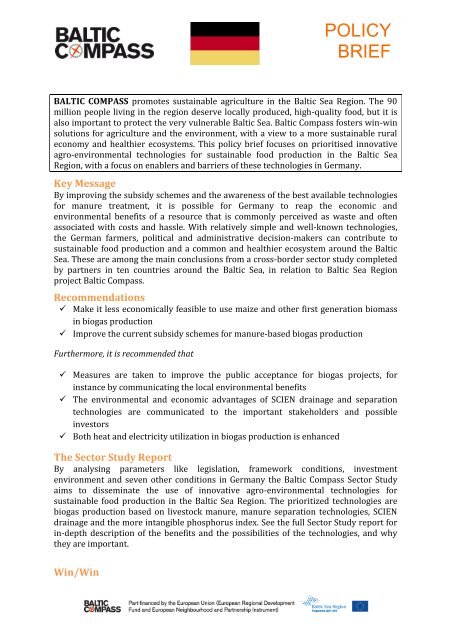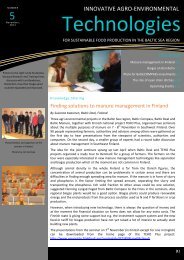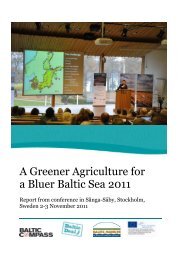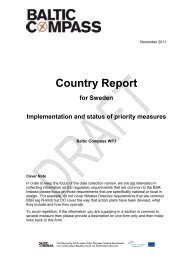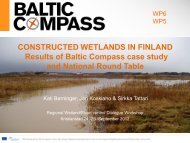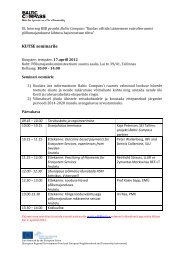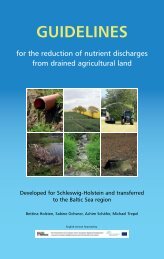POLICY BRIEF - BALTIC COMPASS
POLICY BRIEF - BALTIC COMPASS
POLICY BRIEF - BALTIC COMPASS
You also want an ePaper? Increase the reach of your titles
YUMPU automatically turns print PDFs into web optimized ePapers that Google loves.
<strong>POLICY</strong><strong>BRIEF</strong><strong>BALTIC</strong> <strong>COMPASS</strong> promotes sustainable agriculture in the Baltic Sea Region. The 90million people living in the region deserve locally produced, high-quality food, but it isalso important to protect the very vulnerable Baltic Sea. Baltic Compass fosters win-winsolutions for agriculture and the environment, with a view to a more sustainable ruraleconomy and healthier ecosystems. This policy brief focuses on prioritised innovativeagro-environmental technologies for sustainable food production in the Baltic SeaRegion, with a focus on enablers and barriers of these technologies in Germany.Key MessageBy improving the subsidy schemes and the awareness of the best available technologiesfor manure treatment, it is possible for Germany to reap the economic andenvironmental benefits of a resource that is commonly perceived as waste and oftenassociated with costs and hassle. With relatively simple and well-known technologies,the German farmers, political and administrative decision-makers can contribute tosustainable food production and a common and healthier ecosystem around the BalticSea. These are among the main conclusions from a cross-border sector study completedby partners in ten countries around the Baltic Sea, in relation to Baltic Sea Regionproject Baltic Compass.Recommendations Make it less economically feasible to use maize and other first generation biomassin biogas production Improve the current subsidy schemes for manure-based biogas productionFurthermore, it is recommended that Measures are taken to improve the public acceptance for biogas projects, forinstance by communicating the local environmental benefits The environmental and economic advantages of SCIEN drainage and separationtechnologies are communicated to the important stakeholders and possibleinvestors Both heat and electricity utilization in biogas production is enhancedThe Sector Study ReportBy analysing parameters like legislation, framework conditions, investmentenvironment and seven other conditions in Germany the Baltic Compass Sector Studyaims to disseminate the use of innovative agro-environmental technologies forsustainable food production in the Baltic Sea Region. The prioritized technologies arebiogas production based on livestock manure, manure separation technologies, SCIENdrainage and the more intangible phosphorus index. See the full Sector Study report forin-depth description of the benefits and the possibilities of the technologies, and whythey are important.Win/Win
Often stronger environmental legislative action means more hassle and cost foroperators in the agricultural sector. This again often results in objections and resistancetowards the tightening of these laws. But by increasing the subsidies for renewableenergy based on biogas, the political and administrative decisions makers can boost theincentives for the use of livestock manure in biogas production and by that kill two birdswith one stone: decrease energy dependency from fossil energy sources and increasesustainable food production in the German agricultural sector. The German farmers willhave various incentives to invest in biogas: manure will have an increase field valueafter the anaerobic digestion and furthermore, they will be able to sell heat andelectricity from a resource that is already within the farmer precession.What needs to be done?The environmental benefits of biogas are plentiful and proven, and moreover thebusiness opportunities are many. But in order to fully utilize these, some measures haveto be taken, which involve both political representatives and stakeholders from theGerman agricultural sector. The current situation in Germany calls for more use ofmanure in biogas production and a higher utilization of the heat produced in theelectricity production. This heat contains around 40-50% of the total energy in biogas,and could be used for district heating or industrial purposes near the biogas plant. Thisalso holds a significant potential income for the biogas owner, but the economicincentives for the utilization of the heat should be improved.The high production of maize for biogas production contributes to a monoculture, andfurthermore derives a lot of public dissatisfaction towards biogas plants and theproduction of biogas. From an environmental perspective, the use of maize is at theworst considered to be an environmental disaster. Measures should be taken towardsdecreasing the use of maize and increasing manure in biogas production, for example byadjusting the subsidies. These measures are currently discussed in Germany, but it isimportant to construct the right subsidy schemes in order to get the right environmentaland economic results.ConclusionIn the near future, German agricultural sector will be a producer of both sustainablefood and energy, which will contribute to a better environment around a commonecosystem and an energy independence from an energy market with ever increasingprices. The technologies, the tools and the local resources are already available, and witha few political actions and more cooperative willingness among the stakeholders in theagricultural sector, these low-hanging fruits will be ripe for picking.The entire Sector Study report can be found at www.BalticCompass.org. Questions andcomments about the German Sector Study can be forwarded to Dr Horst Ludley,hludley@t-online.de. For more information on the practical and innovative solutions formanure management, please visit agro-technology-atlas.eu.


